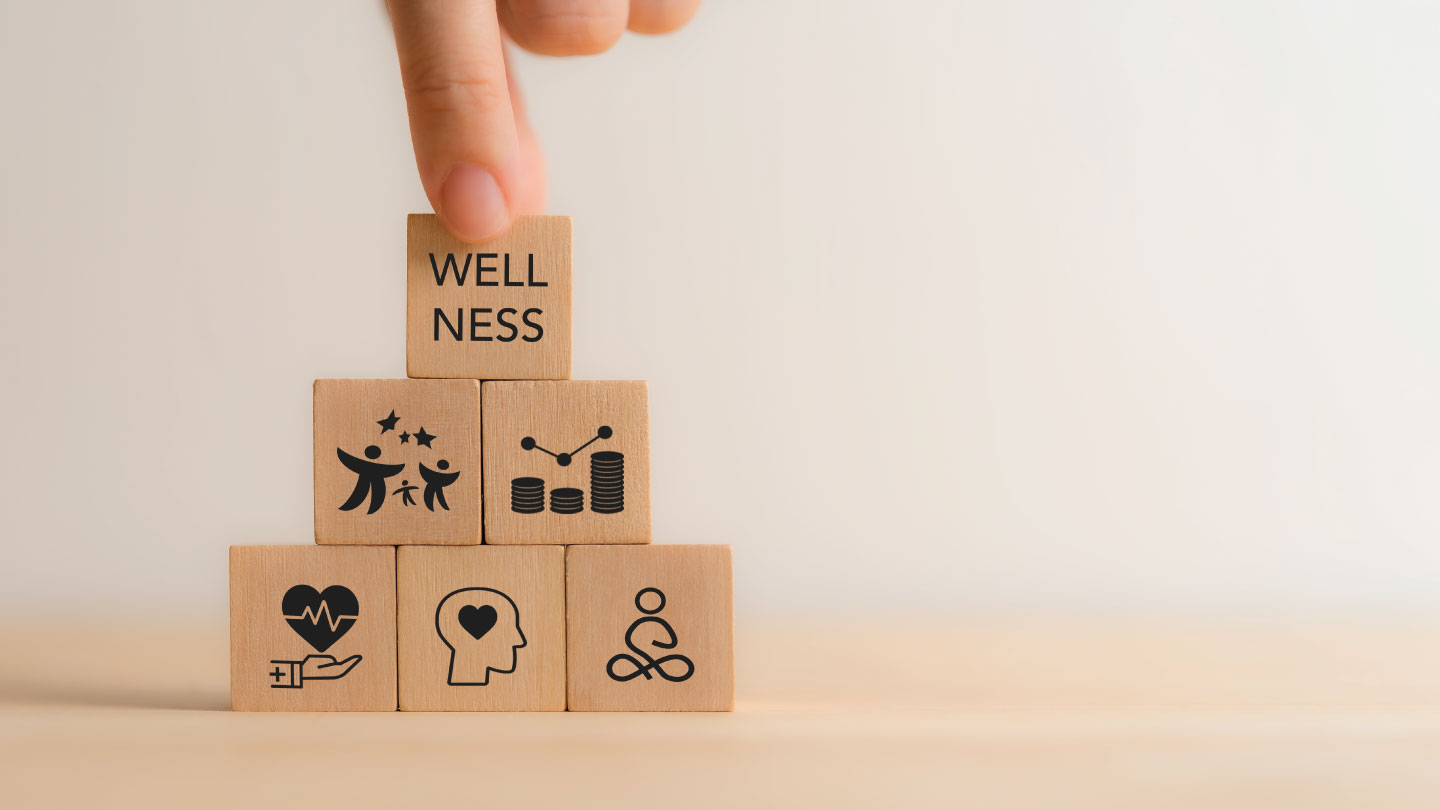Corporate Wellness
Self-Care to Elevate Your Work Game
In this constant race for success and contentment, many focus on the destination rather than the journey. However, it can also make burnout and exhaustion inevitable pitstops. Learn how to care for yourself while elevating your work life.

Many of us have spent most of the past two years at home, leading to an integration of work at home. However, while there were many benefits of working at home, there were several downsides as well, including the failure to keep professional and personal lives separate. It led to many struggling to find a balance in their lives, a consequence of the inability to stop working during non-working hours.
A 2021 survey by Indeed shows that around 52 per cent of the respondents felt symptoms of burning out, and 67 per cent of those respondents believed that burnout became worse over the course of the pandemic. The American Psychological Association’s 2021 Work and Well-Being Survey also revealed that 36 per cent of people reported feeling cognitive weariness and 32 per cent felt emotional exhaustion.
Related Story: Hybrid, WFH, or Full-Time Office - Which Is Better for Your Health?
While we have many flexible working options available today, it becomes important to understand that your body and mind need to be healthy for you to work productively. This is where self-care comes in, and here is what you should know:
Why Is Self-Care Important for Work?
According to a 2021 study published in the International Journal of Nursing Studies, self-care has various proven benefits for individuals. Along with improved well-being, those who practised self-care regularly had lower morbidity, mortality, and healthcare costs. The study also delves into how low levels of depressive symptoms are associated with poor self-care.
It is no secret that when you’re not feeling well, physically or mentally, your work performance can suffer. You may experience a lack of focus at work, frequent dissociation from what you are doing, and a general lack of motivation for your tasks.
With regular self-care, you can combat feelings of stress and burnout, particularly when it’s about work. Reminding yourself that you, as an individual, need love and attention before being an employee is also crucial to keep you productive, relaxed and able to work without worrying about creative blocks.
Our body’s ultradian rhythm, which is a recurring cycle repeated throughout a 24-hour day, can also determine how productive we are during the day. The rhythm can regulate the release of hormones and boost our focus at different points during the day.
As certified executive coach Debeshi Chakraborty says, “It is very interesting to see the correlation between productivity, self-care, and human design. Our body functions on an ultradian rhythm, so our brain’s peak performance starts at around sunrise and lasts for about 90 minutes.”
Knowing that your brain reaches peak focus within a 90-minute window can ensure that you plan ahead for your day knowing when you will be most focused. “It takes 20 minutes to recover, and the cycle begins again.” says Chakraborty. The 20-minute window in which your brain is recovering is a perfect time to not work, and take care of yourself instead. “Knowing this, people can organise their productive tasks for when the sun is up into sprints of 90 minutes. People who are masters, who are leaders, know this pattern and utilise it to increase their productivity throughout the day.” Self-care can be defined as anything that can allow you to recover your energy. Ensuring that you are able to harness the power of self-care for a better life is crucial to managing stress and emotional turmoil in the long-term.
Related Story: How to Win Over Your Monday Blues
Incorporating Self-Care: Home and Work
When you are looking for ways to incorporate self-care at home and work, there are a lot of options. Self-care doesn’t have to cost money or require professionals. It can simply be an activity or hobby that you enjoy doing. Here are some simple ways you can start practising self-care both at home and work:
- Taking frequent breaks: There are times when work can get to be overwhelming or stressful, and it is important to pace yourself during these moments. Stepping outside for a few minutes for some fresh air will not only clear your mind but help you refocus. Try doing this in the 20-minute window where your brain is recovering (according to your ultradian cycle) is a perfect time for a break.
- Keep hydrated: Water is essential to your body and mind for many functions, and it can have a direct impact on your energy levels. According to the National Council on Ageing (USA), regular hydration helps improve brain performance and increases blood flow to all organs in your body, helping you stay energised.
- Create a workspace for you: Whether it’s at home or at your office, creating a space in which you feel comfortable is essential to your long-term productivity and mental state. Think about creating an ergonomic space that enables your body to feel comfortable and your mind to feel focused.
- Reward yourself with healthy food: Making healthy and delicious lunches at home for work will ensure that you are able to sustain yourself throughout the day and not feel bad about what you’re consuming. You can find instant energy foods that help you get over the midday slump and satiate you simultaneously.
- Say no: Knowing your own limits and when you are being overworked is crucial to coping with burnout. While you might be okay with overworking for some time, consistent tendencies to work yourself to exhaustion can quickly impact your mental well-being and quality of work. Limit your tasks and responsibilities when you feel like it is getting too much.
- Be aware: Knowing how your performance is at work and how you can improve is key to ensure your success. Talking to your manager and colleagues can help you understand where you are doing well, and where you’re not, instead of wondering about it by yourself.
- Make peace with yourself: Making mistakes, whether it’s at work or home, is part of living life. Rather than not admitting to making them and agonising over them later, it is best to admit your mistakes and move on as swiftly as possible. Allow yourself the time to reflect and ponder while taking accountability, so you don’t beat yourself up about it in the future. Ultimately it will add to your learning experience, and hone your skills so you don’t repeat these mistakes in the future.
Related Story: 15 Ways to Nourish Body, Mind and Soul
Learning to Be Present
When you are at work, it’s important not to dissociate yourself from where you are and what you are doing to ensure maximum productivity and enjoyment in what you are doing. Instead of focusing on other tasks you have to do throughout the day or week, it’s best to focus on one task at a time so you can finish it quickly and efficiently.
“People use the Pomodoro technique to be present in their situation and plan their productivity and self-care,” says Chakraborty, and this is a great idea for those who struggle with wandering thoughts or procrastination at work. The Pomodoro technique is a time management tool that can be harnessed to ensure that you are able to relax and work at stipulated times.
Begin by focusing on a single task and writing it down. Set a timer to 25 minutes (you can also change this according to your needs) and work on the task until the timer rings. Take a short 5-minute break and set the timer again. If you’ve already finished the task at hand, you can set the timer for another task, and so on, until you’re done for the day.
Related Story: Five Ways to Relax Yourself in Stressful Situations
Self-Management vs. Self-Sabotage
As Chakraborty says, “The greatest self-sabotage is selling your attention to social media, to your screens, for the instant dopamine you receive. It is how the brain works. Dopamine creates reward pathways in your brain, and social media can help dopamine secretion for many. However, we also need to focus on our attention spans.”
It becomes important to consider how we are utilising our time and attention in a world where so much is going on. A ‘harmless’ five minutes on social media can lead you down a rabbit hole that can take hours when you’re not careful. “How is our attention consumed today? If we are not able to invest and utilise our attention properly, it is indirectly self-sabotaging ourselves. Sitting somewhere physically and not paying attention, especially in workplaces, is self-sabotage,” according to Chakraborty
Related Story: Does Social Media Cause Dissociation? Here’s What to Know
“The best solution would be to turn off notifications for all social media apps. When you do have to check your social media, it is best to do it through your laptop. Checking any kind of communication should be done at set times, and not throughout the day,” according to Chakraborty, social media use, in any case, needs to be monitored carefully.
Related Story: Self-Care 101: How to Set Boundaries on Social Media
However, just like self-sabotage is bad, so is extreme self-management. Whether you are in a leadership position or not, self-management, to a certain degree, is required to ensure that you are capable of leading others while finishing your tasks on time. But sometimes, it can lead to an over-management of emotions, and suppression is a common example of that.
Working hard to constantly maintain a professional front, even when you’re not working, can take a toll on your mind. It can feel exhausting trying to always keep a front, and you need to know when to let it down to fully relax at times. Try creating safe spaces where you feel like you can let go of your professional demeanour, and don’t hesitate to confide in your colleagues from time to time. Sharing the burden will ultimately make it easier for you, and there is no harm in letting others know that you sometimes struggle too.
Valuing Self-Care for Your Wellness
Understanding how having a self-care regimen or doing self-care activities can benefit your professional life in the long term is essential to practice it regularly. We live in a world today that is driven by competition and hustle, and it’s easy to get carried away with it sometimes. However, it can lead to a lack of motivation and drive, and ultimately burnout.
Not being mindful of your mental and physical state can also enable emotions such as anxiety, stress, and fear to take control of your life. According to Chakraborty, “Self-care is ultimately a habit. Someone who hasn’t been taught about self-care or how to do it won’t ever know how to do it.” Be aware of ways you can care for yourself and improve in the process, as this is crucial to your work performance and long-term life satisfaction.
Related Story: Why It's Okay Not to Have It All Figured Out
EXPLORE MORE
Early health signals are warnings, not noise and they shape workforce outcomes. We must recognise these signals as strategic indicators of workforce well-being and long-term productivity.
Hybrid work promised flexibility and balance, but for many, it’s silently eroding the boundary between work and life. Burnout today isn’t just about doing more; it’s about being always on.
You’ve worked through the night, and the sun’s already up. Here’s a realistic plan to reclaim your energy, sleep better, and keep your health intact.
Tired of endless, aimless meetings? These five habits turn dull sessions into focused, energising discussions.




.jpg)


